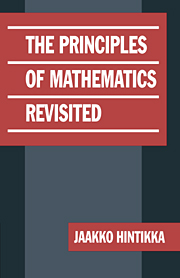Book contents
- Frontmatter
- Contents
- Introduction
- 1 The functions of logic and the problem of truth definition
- 2 The game of logic
- 3 Frege's fallacy foiled: Independence-friendly logic
- 4 The joys of independence: Some uses of IF logic
- 5 The complexities of completeness
- 6 Who's afraid of Alfred Tarski? Truth definitions for IF first-order languages
- 7 The liar belied: Negation in IF logic
- 8 Axiomatic set theory: Fraenkelstein's monster?
- 9 IF logic as a framework for mathematical theorizing
- 10 Constructivism reconstructed
- 11 The epistemology of mathematical objects
- Appendix (by Gabriel Sandu)
- References
- Index of names
- Index of subjects and titles
5 - The complexities of completeness
Published online by Cambridge University Press: 15 December 2009
- Frontmatter
- Contents
- Introduction
- 1 The functions of logic and the problem of truth definition
- 2 The game of logic
- 3 Frege's fallacy foiled: Independence-friendly logic
- 4 The joys of independence: Some uses of IF logic
- 5 The complexities of completeness
- 6 Who's afraid of Alfred Tarski? Truth definitions for IF first-order languages
- 7 The liar belied: Negation in IF logic
- 8 Axiomatic set theory: Fraenkelstein's monster?
- 9 IF logic as a framework for mathematical theorizing
- 10 Constructivism reconstructed
- 11 The epistemology of mathematical objects
- Appendix (by Gabriel Sandu)
- References
- Index of names
- Index of subjects and titles
Summary
In view of what was said in Chapters 3–4, there is no doubt about the character of IF first-order logic as the basic area of our logic. But what is this logic like? What is new about it? In Chapters 3–4, a number of partial answers were given to these questions. Perhaps the most general one concerns the expressive strength of our new basic logic. In view of the close similarity between ordinary and IF first-order logic, it may come as a surprise that IF first-order logic is much stronger than its more restricted traditional version. How much stronger will become clearer in the course of my examination of its properties and applications.
One consequence of the strength of IF first-order logic is that it does not admit of a complete axiomatization. The set of valid formulas of IF first-order logic is not recursively enumerable. Hence there is no finite (or recursive) set of axioms from which all valid sentences of this logic can be derived as theorems by means of completely formal (recursive) rules of inference. Thus the first remarkable property of IF first-order logic is that, unlike its special case of ordinary first-order logic, it does not admit of a complete axiomatization. The reasons for this incompleteness will be explained in Chapter 7.
How are we to react to this incompleteness? Different perspectives are possible here. Purely technically, in view of the power of IF first-order logic, the failure of this logic to be axiomatizable is perhaps not entirely surprising.
Information
- Type
- Chapter
- Information
- The Principles of Mathematics Revisited , pp. 88 - 104Publisher: Cambridge University PressPrint publication year: 1996
